Mistäs tulet, kustas tulet, poikani iloinen?
Mie tulen meren rannast', miun äitini kultainen.
Mitä sieltä tekemästä, poikani iloinen?
Hevostani juottamasta, miun äitini kultainen.
Mist’ on saappaas' saveen tullut, poikani iloinen?
Mie kuljin vaan tietä pitkin, miun äitini kultainen.
Mist’ on miekkais verreen tullut, poikani iloinen?
Mie tapoin vanhemman veljen, miun äitini kultainen.
Mintähen sinä veljesi tapoit, poikani iloinen?
Miks' hän miun naista nauratteli, miun äitini kultainen.
Mihin sie nyt itse joudut, poikani iloinen?
Muille maille vierahille, miun äitini kultainen
Milloin sie sieltä kottiin palaat, poikani iloinen?
Silloin kun tähdet taivaalla tanssii, miun äitini kultainen.
Milloin ne tähdet taivaalla tanssii, poikani iloinen?
Silloin kun kivi veen pääll' lillii, miun äitini kultainen.
Milloin se kivi veen pääll' lillii, poikani iloinen?
Sillon kun höyhen uppoo vatiin, miun äitini kultainen.
Millon se höyhen uppoo vatiin, poikani iloinen?
Silloin kun kaikki tuomiolle tullaan.
Mie tulen meren rannast', miun äitini kultainen.
Mitä sieltä tekemästä, poikani iloinen?
Hevostani juottamasta, miun äitini kultainen.
Mist’ on saappaas' saveen tullut, poikani iloinen?
Mie kuljin vaan tietä pitkin, miun äitini kultainen.
Mist’ on miekkais verreen tullut, poikani iloinen?
Mie tapoin vanhemman veljen, miun äitini kultainen.
Mintähen sinä veljesi tapoit, poikani iloinen?
Miks' hän miun naista nauratteli, miun äitini kultainen.
Mihin sie nyt itse joudut, poikani iloinen?
Muille maille vierahille, miun äitini kultainen
Milloin sie sieltä kottiin palaat, poikani iloinen?
Silloin kun tähdet taivaalla tanssii, miun äitini kultainen.
Milloin ne tähdet taivaalla tanssii, poikani iloinen?
Silloin kun kivi veen pääll' lillii, miun äitini kultainen.
Milloin se kivi veen pääll' lillii, poikani iloinen?
Sillon kun höyhen uppoo vatiin, miun äitini kultainen.
Millon se höyhen uppoo vatiin, poikani iloinen?
Silloin kun kaikki tuomiolle tullaan.
inviata da Riccardo Venturi - 18/4/2019 - 00:19
Lingua: Finlandese
Adattamento del poema originale / Adaptation of the original poem / Adaptation du poème original / Alkuperäisen runon mukaelma: Eino Leino - 1920
VELISURMAAJA
Mistäs saavut, myöhään saavut,
poikani metsämies? –
Isänmaan illasta, erämaan aamusta,
äitini lempeä-lies.
Miksi niin kasvosi kalpeilta paistaa,
outo on äänesi, laps? –
Paistoi hangilla kuoleman kuudan,
valkeni poski ja haps.
Miksi niin rintasi raskaasti huokaa,
suihkaen suonesi lyö? –
Hiihdin mä kilpaa hiisien kanssa,
ympäri surma ja yö.
Miksi niin silmäsi tuimasti tuikkii,
autio otsasi on? –
Vilkkuivat vinhemmin taivaalla tähdet,
tuomarit turmion.
Minne on jäänyt sun luontosi lempee,
hellyytes herttainen? –
Sauhun kentille, kauhun kentille,
valtahan vainajien.
Syöksyikö vieras syntymämaahan,
kansaako kaas vihamies? –
Ei, oma heimo herjaksi muuttui,
oma oli orjuuden ies.
Nousitko vastaan sortajavaltaa,
kun sotatorvet soi? –
Lasken lautsalle raudan raa’an,
veljien verta se joi.
Voitonko liet vai tappion viesti,
saata et ilosanomaa. –
Itkeä ikäni tahtoisin, vaikka
vapaa on kansa ja maa.
Auta, armias! Rikki on rintas,
hurmeesi huppeloi! –
Sain ma itsekin surman iskun,
kuoleman kellot jo soi.
Kaikkiko kadotan lapseni armaat,
taasko on taistohon ties? –
Lähtevi rauhaan Tuonen rannan
poikasi murhamies.
Heitätkö äitisi raukan ja rakkaan,
myös pyhän syntymämaan? –
Kohisevat korvaani Manalan kosket,
siellä ma saan isänmaan.
Mistäs saavut, myöhään saavut,
poikani metsämies? –
Isänmaan illasta, erämaan aamusta,
äitini lempeä-lies.
Miksi niin kasvosi kalpeilta paistaa,
outo on äänesi, laps? –
Paistoi hangilla kuoleman kuudan,
valkeni poski ja haps.
Miksi niin rintasi raskaasti huokaa,
suihkaen suonesi lyö? –
Hiihdin mä kilpaa hiisien kanssa,
ympäri surma ja yö.
Miksi niin silmäsi tuimasti tuikkii,
autio otsasi on? –
Vilkkuivat vinhemmin taivaalla tähdet,
tuomarit turmion.
Minne on jäänyt sun luontosi lempee,
hellyytes herttainen? –
Sauhun kentille, kauhun kentille,
valtahan vainajien.
Syöksyikö vieras syntymämaahan,
kansaako kaas vihamies? –
Ei, oma heimo herjaksi muuttui,
oma oli orjuuden ies.
Nousitko vastaan sortajavaltaa,
kun sotatorvet soi? –
Lasken lautsalle raudan raa’an,
veljien verta se joi.
Voitonko liet vai tappion viesti,
saata et ilosanomaa. –
Itkeä ikäni tahtoisin, vaikka
vapaa on kansa ja maa.
Auta, armias! Rikki on rintas,
hurmeesi huppeloi! –
Sain ma itsekin surman iskun,
kuoleman kellot jo soi.
Kaikkiko kadotan lapseni armaat,
taasko on taistohon ties? –
Lähtevi rauhaan Tuonen rannan
poikasi murhamies.
Heitätkö äitisi raukan ja rakkaan,
myös pyhän syntymämaan? –
Kohisevat korvaani Manalan kosket,
siellä ma saan isänmaan.
inviata da Juha Rämö - 27/7/2020 - 20:49
Lingua: Inglese
Englanninkielinen käännös / English translation / Traduzione inglese / Traduction anglaise:
Lahnuska (Jasmin), L. Trans.
Lahnuska (Jasmin), L. Trans.
THE FRATRICIDE
Where are you coming from, my merry son?
I'm coming from the seashore, my dear mother
What were you doing there, my merry son?
I gave my horse some water, my dear mother
Where have you gotten your boots muddy, my merry son?
Well, I walked by the road, my dear mother
Where have you gotten your sword bloody, my merry son?
I killed my older brother, my dear mother
What did you kill your brother for, my merry son?
Why was he making my woman laugh, my dear mother.
Where will you have to go now, my merry son?
To other, foreign lands, my dear mother
When will you come back from there, my merry son?
When the stars dance on the sky, my dear mother
When will the stars dance on the sky, my merry son?
When a stone floats on water, my dear mother
When will the stone float on water, my merry son?
When a feather sinks, my dear mother
When will the feather sink, my merry son?
When we all will be judged in the end.
Where are you coming from, my merry son?
I'm coming from the seashore, my dear mother
What were you doing there, my merry son?
I gave my horse some water, my dear mother
Where have you gotten your boots muddy, my merry son?
Well, I walked by the road, my dear mother
Where have you gotten your sword bloody, my merry son?
I killed my older brother, my dear mother
What did you kill your brother for, my merry son?
Why was he making my woman laugh, my dear mother.
Where will you have to go now, my merry son?
To other, foreign lands, my dear mother
When will you come back from there, my merry son?
When the stars dance on the sky, my dear mother
When will the stars dance on the sky, my merry son?
When a stone floats on water, my dear mother
When will the stone float on water, my merry son?
When a feather sinks, my dear mother
When will the feather sink, my merry son?
When we all will be judged in the end.
inviata da Riccardo Venturi - 18/4/2019 - 00:51
Lingua: Italiano
Traduzione italiana / Italian translation / Traduction italienne / Italiankielinen käännös:
Riccardo Venturi, 18-04-2019 22:49
The following Italian translation accompanies the first version of the song given here and is made from the English translation provided. Thanks to Juha Rämö for checking the translation and for providing the other version and its English translation. Just one final remark: the song is wonderful, and I think the Finnish language adds still more to its beauty.
Riccardo Venturi, 18-04-2019 22:49
The following Italian translation accompanies the first version of the song given here and is made from the English translation provided. Thanks to Juha Rämö for checking the translation and for providing the other version and its English translation. Just one final remark: the song is wonderful, and I think the Finnish language adds still more to its beauty.
IL FRATRICIDA
Da dove vieni, mio gaio figlio?
Vengo dalla riva del mare, mia cara madre
E che ci facevi, mio gaio figlio?
Davo un po' d'acqua al mio cavallo, mia cara madre
Dove ti sei infangato gli stivali, mio gaio figlio?
Beh, camminavo per la strada, mia cara madre
Dove hai insanguinato la spada, mio gaio figlio?
Ho ucciso mio fratello maggiore, mia cara madre
Perché hai ucciso tuo fratello, mio gaio figlio?
Perché stava rallegrando la mia donna, mia cara madre.
E ora dove te ne andrai, mio gaio figlio?
In altre terre, in terra straniera, mia cara madre
E quando ne tornerai, mio gaio figlio?
Quando le stelle balleranno in cielo, mia cara madre
Quando balleranno le stelle in cielo, mio gaio figlio?
Quando una pietra galleggerà sull'acqua, mia cara madre
Quando galleggerà la pietra sull'acqua, mio gaio figlio?
Quando una piuma andrà a fondo, mia cara madre
Quando andrà a fondo la pietra, mio gaio figlio?
Quando tutti saremo giudicati alla fine dei tempi.
Da dove vieni, mio gaio figlio?
Vengo dalla riva del mare, mia cara madre
E che ci facevi, mio gaio figlio?
Davo un po' d'acqua al mio cavallo, mia cara madre
Dove ti sei infangato gli stivali, mio gaio figlio?
Beh, camminavo per la strada, mia cara madre
Dove hai insanguinato la spada, mio gaio figlio?
Ho ucciso mio fratello maggiore, mia cara madre
Perché hai ucciso tuo fratello, mio gaio figlio?
Perché stava rallegrando la mia donna, mia cara madre.
E ora dove te ne andrai, mio gaio figlio?
In altre terre, in terra straniera, mia cara madre
E quando ne tornerai, mio gaio figlio?
Quando le stelle balleranno in cielo, mia cara madre
Quando balleranno le stelle in cielo, mio gaio figlio?
Quando una pietra galleggerà sull'acqua, mia cara madre
Quando galleggerà la pietra sull'acqua, mio gaio figlio?
Quando una piuma andrà a fondo, mia cara madre
Quando andrà a fondo la pietra, mio gaio figlio?
Quando tutti saremo giudicati alla fine dei tempi.
Lingua: Islandese
Þýtt hefur á íslensku / Traduzione islandese / Icelandic translation / Traduction islandaise / Islanninkielinen käännös:
Riccardo Venturi (Rikarður V. Albertsson), 23-10-2019 01:47
Riccardo Venturi (Rikarður V. Albertsson), 23-10-2019 01:47
Þessa þýðingu má syngja í takt við útgáfu Niekku [R.V.A.]
BRÓÐURMORÐINGINN
Segðu mér hvaðan þú ert kominn, glaði sonur minn?
Kominn er ég frá sjávarströndinni, elsku móðir mín.
Hvað varstu að gera þarna, glaði sonur minn?
Var ég að vökva hestana mína, elsku móðir mín.
Hvar hefurðu atað stígvélin þín, glaði sonur minn?
Vel, á gönguleið á heimavegi, elsku móðir mín.
Af hverju er sverð þitt blóðflekkað, glaði sonur minn?
Ég drap eldra bróður minn, elsku móðir mín.
Af hverju drapstu bróður þinn, glaði sonur minn?
Sóttist hann eftir konu mína, elsku móðir mín.
Hvert ætlar þú að fara núna, glaði sonur minn?
Til fjarlægra erlendra landa, elsku móðir mín.
Hvenær kemur þú þaðan aftur, glaði sonur minn?
Þegar stjörnur dansa á himni, elsku móðir mín.
Hvenær dansa stjörnur á himni, glaði sonur minn?
Þegar steinn flýtur á sjóvatni, elsku móðir mín.
Hvenær flýtur steinn á sjóvatni, glaði sonur minn?
Þegar fjaðrir sökkva í sjóvatn, elsku móðir mín.
Hvenær sökkva fjaðrir í sjóvatn, glaði sonur minn?
Þegar við öll verðum dæmd á endann, elsku móðir mín.
Segðu mér hvaðan þú ert kominn, glaði sonur minn?
Kominn er ég frá sjávarströndinni, elsku móðir mín.
Hvað varstu að gera þarna, glaði sonur minn?
Var ég að vökva hestana mína, elsku móðir mín.
Hvar hefurðu atað stígvélin þín, glaði sonur minn?
Vel, á gönguleið á heimavegi, elsku móðir mín.
Af hverju er sverð þitt blóðflekkað, glaði sonur minn?
Ég drap eldra bróður minn, elsku móðir mín.
Af hverju drapstu bróður þinn, glaði sonur minn?
Sóttist hann eftir konu mína, elsku móðir mín.
Hvert ætlar þú að fara núna, glaði sonur minn?
Til fjarlægra erlendra landa, elsku móðir mín.
Hvenær kemur þú þaðan aftur, glaði sonur minn?
Þegar stjörnur dansa á himni, elsku móðir mín.
Hvenær dansa stjörnur á himni, glaði sonur minn?
Þegar steinn flýtur á sjóvatni, elsku móðir mín.
Hvenær flýtur steinn á sjóvatni, glaði sonur minn?
Þegar fjaðrir sökkva í sjóvatn, elsku móðir mín.
Hvenær sökkva fjaðrir í sjóvatn, glaði sonur minn?
Þegar við öll verðum dæmd á endann, elsku móðir mín.
Lingua: Finlandese
»Mistäs tulet, kustas tulet,
poikani iloinen?« –
»Meren rannalta, meren rannalta,
äitini kultainen.«
»Mitä sieltä tekemästä,
poikani iloinen?« –
»Hevostani juottamasta,
äitini kultainen.«
»Mist' on selkäsi saveen tullut,
poikani iloinen?« –
»Hevonen huiskasi hännällänsä,
äitini kultainen.«
»Mist' on jalkasi vereen tullut,
poikani iloinen?« –
»Hevonen polkasi rauallansa,
äitini kultainen.«
»Mist' on miekkasi vereen tullut,
poikani iloinen?« –
»Pistin veljeni kuoliaksi,
äitini kultainen.«
»Mintähen sinä veljesi pistit,
poikani poloinen?« –
»Mintähen naistani nauratteli,
muorini kultainen.«
»Minne nyt sinä itse jouvut,
poikani poloinen?« –
»Muille maille vierahille,
muorini kultainen.«
»Minne heität taattosi vanhan,
poikani poloinen?« –
»Mieron verkkoja paikatkohon,
muorini kultainen.«
»Minne heität maammosi vanhan,
poikani poloinen?« –
»Mieron rihmoja keträtköhön,
muorini kultainen.«
»Minne heität naisesi nuoren,
poikani poloinen?« –
»Mieron miehiä katselkohon,
muorini kultainen.«
»Minne heität poikasi nuoren,
poikani poloinen?« –
»Mieron koulua kärsiköhön,
muorini kultainen.«
»Minne heität tyttösi nuoren,
poikani poloinen?« –
»Mieron karjoja kaitsekohon,
muorini kultainen.«
»Koskas sieltä kotihin käännyt,
poikani poloinen?« –
»Konsa korppi valkenevi,
muorini kultainen.«
»Koskas korppi valkenevi,
poikani poloinen?« –
»Konsa hanhi mustenevi,
muorini kultainen.«
»Koskas hanhi mustenevi,
poikani poloinen?« –
»Konsa kivi veen päällä pyörii,
muorini kultainen.«
»Koskas kivi veen päällä pyörii,
poikani poloinen?« –
»Konsa höyhen pohjaan painuu,
muorini kultainen.«
»Koskas höyhen pohjaan painuu,
poikani poloinen?«–
»Konsa päivä syänyöllä paistaa,
muorini kultainen.«
»Koskas päivä syänyöllä paistaa,
poikani poloinen?« –
»Konsa kuuhut kuumasti polttaa,
muorini kultainen.«
»Koskas kuuhut kuumasti polttaa,
poikani poloinen?« –
»Konsa tähet taivaalla tanssii,
muorini kultainen.«
»Koskas tähet taivaalla tanssii,
poikani poloinen?« –
»Konsa kaikki tuomiolle tullaan,
muorini kultainen.«
poikani iloinen?« –
»Meren rannalta, meren rannalta,
äitini kultainen.«
»Mitä sieltä tekemästä,
poikani iloinen?« –
»Hevostani juottamasta,
äitini kultainen.«
»Mist' on selkäsi saveen tullut,
poikani iloinen?« –
»Hevonen huiskasi hännällänsä,
äitini kultainen.«
»Mist' on jalkasi vereen tullut,
poikani iloinen?« –
»Hevonen polkasi rauallansa,
äitini kultainen.«
»Mist' on miekkasi vereen tullut,
poikani iloinen?« –
»Pistin veljeni kuoliaksi,
äitini kultainen.«
»Mintähen sinä veljesi pistit,
poikani poloinen?« –
»Mintähen naistani nauratteli,
muorini kultainen.«
»Minne nyt sinä itse jouvut,
poikani poloinen?« –
»Muille maille vierahille,
muorini kultainen.«
»Minne heität taattosi vanhan,
poikani poloinen?« –
»Mieron verkkoja paikatkohon,
muorini kultainen.«
»Minne heität maammosi vanhan,
poikani poloinen?« –
»Mieron rihmoja keträtköhön,
muorini kultainen.«
»Minne heität naisesi nuoren,
poikani poloinen?« –
»Mieron miehiä katselkohon,
muorini kultainen.«
»Minne heität poikasi nuoren,
poikani poloinen?« –
»Mieron koulua kärsiköhön,
muorini kultainen.«
»Minne heität tyttösi nuoren,
poikani poloinen?« –
»Mieron karjoja kaitsekohon,
muorini kultainen.«
»Koskas sieltä kotihin käännyt,
poikani poloinen?« –
»Konsa korppi valkenevi,
muorini kultainen.«
»Koskas korppi valkenevi,
poikani poloinen?« –
»Konsa hanhi mustenevi,
muorini kultainen.«
»Koskas hanhi mustenevi,
poikani poloinen?« –
»Konsa kivi veen päällä pyörii,
muorini kultainen.«
»Koskas kivi veen päällä pyörii,
poikani poloinen?« –
»Konsa höyhen pohjaan painuu,
muorini kultainen.«
»Koskas höyhen pohjaan painuu,
poikani poloinen?«–
»Konsa päivä syänyöllä paistaa,
muorini kultainen.«
»Koskas päivä syänyöllä paistaa,
poikani poloinen?« –
»Konsa kuuhut kuumasti polttaa,
muorini kultainen.«
»Koskas kuuhut kuumasti polttaa,
poikani poloinen?« –
»Konsa tähet taivaalla tanssii,
muorini kultainen.«
»Koskas tähet taivaalla tanssii,
poikani poloinen?« –
»Konsa kaikki tuomiolle tullaan,
muorini kultainen.«
inviata da Juha Rämö - 18/4/2019 - 14:16
Lingua: Inglese
Testo inglese / English lyrics / Paroles anglaises / Englanninkieliset sanat: Lani K. Thompson
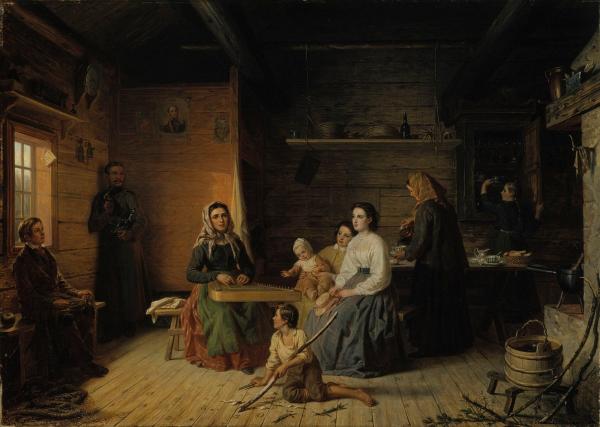

THE BROTHER MURDERER
»Where do you come from,
my cheerful son?«
»From the seashore,
my dear mother.«
»What were you doing there,
my cheerful son?«
»I brought my horse to drink,
my dear mother.«
»Why do you have clay on your back,
my cheerful son?«
»Because my horse swished his tail,
my dear mother.«
»Why do you have blood on your leg,
my cheerful son?«
»Because my horse kicked my leg,
my dear mother.«
»Why is there blood upon your sword,
my cheerful son?«
»Because I stabbed my brother to death,
my dear mother.«
»Why did you stab your brother to death,
my poor dear son?«
»Because he flirted with my girl,
my dear mother.«
»Where will you go now,
my poor dear son?«
»Off to strange lands,
my dear mother.«
»Where will you leave your father,
my poor dear son?«
»Let him patch a stranger's nets,
my dear mother.«
»Where will you leave your mother,
my poor dear son?«
»Let her spin a stranger's threads,
my dear mother.«
»Where will you leave your sweetheart,
my poor dear son?«
»Let her look at strange men,
my dear mother.«
»Where will you leave your young son,
my poor dear son?«
»Let him learn the beggar's trade,
my dear mother.«
»Where will you leave your young daughter,
my poor dear son?«
»Let her watch over a stranger's cattle,
my dear mother.«
(Six stanzas are missing here compared
to the Finnish original from Kanteletar)
»When will you come back again,
my poor dear son?«
»When the stars go dancing in the sky,
my dear mother.«
»When will the stars dance in the sky,
my poor dear son?«
»The stars will dance on Judgment Day,
my dear mother.«
»Where do you come from,
my cheerful son?«
»From the seashore,
my dear mother.«
»What were you doing there,
my cheerful son?«
»I brought my horse to drink,
my dear mother.«
»Why do you have clay on your back,
my cheerful son?«
»Because my horse swished his tail,
my dear mother.«
»Why do you have blood on your leg,
my cheerful son?«
»Because my horse kicked my leg,
my dear mother.«
»Why is there blood upon your sword,
my cheerful son?«
»Because I stabbed my brother to death,
my dear mother.«
»Why did you stab your brother to death,
my poor dear son?«
»Because he flirted with my girl,
my dear mother.«
»Where will you go now,
my poor dear son?«
»Off to strange lands,
my dear mother.«
»Where will you leave your father,
my poor dear son?«
»Let him patch a stranger's nets,
my dear mother.«
»Where will you leave your mother,
my poor dear son?«
»Let her spin a stranger's threads,
my dear mother.«
»Where will you leave your sweetheart,
my poor dear son?«
»Let her look at strange men,
my dear mother.«
»Where will you leave your young son,
my poor dear son?«
»Let him learn the beggar's trade,
my dear mother.«
»Where will you leave your young daughter,
my poor dear son?«
»Let her watch over a stranger's cattle,
my dear mother.«
(Six stanzas are missing here compared
to the Finnish original from Kanteletar)
»When will you come back again,
my poor dear son?«
»When the stars go dancing in the sky,
my dear mother.«
»When will the stars dance in the sky,
my poor dear son?«
»The stars will dance on Judgment Day,
my dear mother.«
inviata da Juha Rämö - 18/4/2019 - 14:18
Lingua: Inglese
Testo inglese / English lyrics / Paroles anglaises / Englanninkieliset sanat: Antti-Juhani Kaijanaho
This is a 2008 translation of all the 20 stanzas of the original song from the Kanteletar.
This is a 2008 translation of all the 20 stanzas of the original song from the Kanteletar.
THE BROTHER SLAYER
»Where do you come from,
my son, my merry son?« -
»I come from the shore,
my mother, dear mother.«
»What were you doing there,
my son, my merry son?« -
»I watered my horse,
my mother, dear mother.«
»How did your coat get all muddy,
my son, my merry son?« -
»The horse wagged his tail,
my mother, dear mother.«
»How did your feet get all bloody,
my son, my merry son?« -
»The horse kicked with his shoe,
my mother, dear mother.«
»How did your sword get all bloody,
my son, my merry son?« -
»I stabbed my brother dead,
my mother, dear mother.«
»Why did you stab your brother,
my son, my wretched son?« -
»Why did he please my woman,
my mother, beloved mother.«
»Where is your own destiny now,
my son, my wretched son?« -
»In other countries, foreign countries,
my mother, beloved mother.«
»What shall befall your old man,
my son, my wretched son?« -
»Let him seek the workhouse,
my mother, beloved mother.«
»What shall befall your old woman,
my son, my wretched son?« -
»Let her beg for her bread,
my mother, beloved mother.«
»What shall befall your young wife,
my son, my wretched son?« -
»Let her walk the streets,
my mother, beloved mother.«
»What shall befall your young son,
My son, my wretched son?« -
»Let him learn the cruelty of men,
my mother, beloved mother.«
»What shall befall your young daughter,
my son, my wretched son?« -
»Let her serve the whims of the lords,
my mother, beloved mother.«
»When shall you return home,
my son, my wretched son?« -
»When the white raven flies,
my mother, beloved mother.«
»When shall the white raven fly,
my son, my wretched son?« -
»When the black goose appears,
my mother, beloved mother.«
»When shall the black goose appear,
my son, my wretched son?« -
»When a rock dances on the water,
my mother, beloved mother.«
»When shall a rock dance on the water,
my son, my wretched son?« -
»When a feather sinks to the bottom,
my mother, beloved mother.«
»When shall a feather sink to the bottom,
my son, my wretched son?« -
»When the night is bright,
my mother, beloved mother.«
»When shall the night be bright,
my son, my wretched son?« -
»When the moonshine warms the earth,
my mother, beloved mother.«
»When shall the moonshine warm the earth,
my son, my wretched son?« -
»When the stars dance in the sky,
my mother, beloved mother.«
»When shall the stars dance in the sky,
my son, my wretched son?« -
»When the judgment day comes,
my mother, beloved mother.«
»Where do you come from,
my son, my merry son?« -
»I come from the shore,
my mother, dear mother.«
»What were you doing there,
my son, my merry son?« -
»I watered my horse,
my mother, dear mother.«
»How did your coat get all muddy,
my son, my merry son?« -
»The horse wagged his tail,
my mother, dear mother.«
»How did your feet get all bloody,
my son, my merry son?« -
»The horse kicked with his shoe,
my mother, dear mother.«
»How did your sword get all bloody,
my son, my merry son?« -
»I stabbed my brother dead,
my mother, dear mother.«
»Why did you stab your brother,
my son, my wretched son?« -
»Why did he please my woman,
my mother, beloved mother.«
»Where is your own destiny now,
my son, my wretched son?« -
»In other countries, foreign countries,
my mother, beloved mother.«
»What shall befall your old man,
my son, my wretched son?« -
»Let him seek the workhouse,
my mother, beloved mother.«
»What shall befall your old woman,
my son, my wretched son?« -
»Let her beg for her bread,
my mother, beloved mother.«
»What shall befall your young wife,
my son, my wretched son?« -
»Let her walk the streets,
my mother, beloved mother.«
»What shall befall your young son,
My son, my wretched son?« -
»Let him learn the cruelty of men,
my mother, beloved mother.«
»What shall befall your young daughter,
my son, my wretched son?« -
»Let her serve the whims of the lords,
my mother, beloved mother.«
»When shall you return home,
my son, my wretched son?« -
»When the white raven flies,
my mother, beloved mother.«
»When shall the white raven fly,
my son, my wretched son?« -
»When the black goose appears,
my mother, beloved mother.«
»When shall the black goose appear,
my son, my wretched son?« -
»When a rock dances on the water,
my mother, beloved mother.«
»When shall a rock dance on the water,
my son, my wretched son?« -
»When a feather sinks to the bottom,
my mother, beloved mother.«
»When shall a feather sink to the bottom,
my son, my wretched son?« -
»When the night is bright,
my mother, beloved mother.«
»When shall the night be bright,
my son, my wretched son?« -
»When the moonshine warms the earth,
my mother, beloved mother.«
»When shall the moonshine warm the earth,
my son, my wretched son?« -
»When the stars dance in the sky,
my mother, beloved mother.«
»When shall the stars dance in the sky,
my son, my wretched son?« -
»When the judgment day comes,
my mother, beloved mother.«
inviata da Juha Rämö - 21/4/2019 - 16:01
Lingua: Inglese
Testo inglese / English lyrics / Paroles anglaises / Englanninkieliset sanat: Keith Bosley, performed by Amorphis
Audio link to the song performed by Amorphis on their 1997 EP »My Kantele«
Audio link to the song performed by Amorphis on their 1997 EP »My Kantele«
THE BROTHER-SLAYER
Where have you been, where have you been
my son, my merry son?
On the seashore, on the seashore
mother, my darling one.
And what have you been doing there
my son, my merry son?
I have been watering my horse
mother, my darling one.
Why is there blood upon your feet
my son, my merry son?
My horse stamped with its iron shoe
mother, my darling one.
Why there is blood upon your sword
my son, my merry son?
I have stabbed my brother to death
mother, my darling one.
What now of you, where will you go
my son, my wretched son?
To other lands to foreign lands
my dame, my darling one.
When will you be returning home
my son, my wretched son?
When all the world to judgement comes
my dame, my darling one.
Why is there blood upon your feet
my son, my merry son?
My horse stamped with its iron shoe
mother, my darling one.
Why there is blood upon your sword
my son, my merry son?
I have stabbed my brother to death
mother, my darling one.
Where have you been, where have you been
my son, my merry son?
On the seashore, on the seashore
mother, my darling one.
And what have you been doing there
my son, my merry son?
I have been watering my horse
mother, my darling one.
Why is there blood upon your feet
my son, my merry son?
My horse stamped with its iron shoe
mother, my darling one.
Why there is blood upon your sword
my son, my merry son?
I have stabbed my brother to death
mother, my darling one.
What now of you, where will you go
my son, my wretched son?
To other lands to foreign lands
my dame, my darling one.
When will you be returning home
my son, my wretched son?
When all the world to judgement comes
my dame, my darling one.
Why is there blood upon your feet
my son, my merry son?
My horse stamped with its iron shoe
mother, my darling one.
Why there is blood upon your sword
my son, my merry son?
I have stabbed my brother to death
mother, my darling one.
inviata da Juha Rämö - 21/4/2019 - 16:02
Lingua: Inglese
Traduzione inglese / English translation / Traduction anglaise / Englanninkielinen käännös: Keith Bosley)
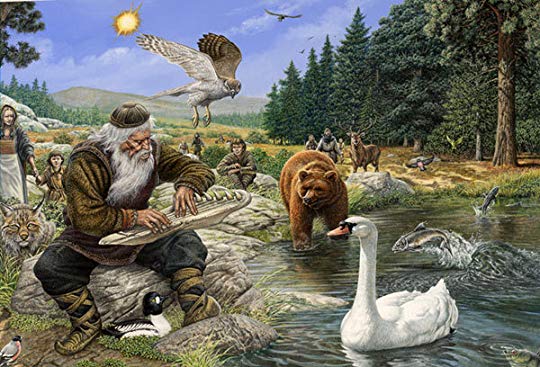



THE BROTHER-SLAYER
Where have you been, where have you been
my son, my merry son?
On the seashore, on the seashore
mother, my darling one.
And what have you been doing there
my son, my merry son?
I have been watering my horse
mother, my darling one.
Why is there mud upon your back
my son, my merry son?
Because my horse it swished its tail
mother, my darling one.
Why is there blood upon your feet
my son, my merry son?
My horse stamped with its iron shoe
mother, my darling one.
Why is there blood upon your sword
my son, my merry son?
I have stabbed my brother to death
mother, my darling one.
Why did you stab your brother dead
my son, my wretched son?
Because he dallied with my wife
my dame, my darling one.
What now of you, where will you go
my son, my wretched son?
To other lands, to foreign lands
my dame, my darling one.
Where will you leave your old father
my son, my wretched son?
O let him mend the parish nets
my dame, my darling one.
Where will you leave your old mother
my son, my wretched son?
O let her spin the parish threads
my dame, my darling one.
Where will you leave your fair young wife
my son, my wretched son?
Let her look on the parish men
my dame, my darling one.
Where will you leave your little boy
my son, my wretched son?
O let him bear the parish school
my dame, my darling one.
Where will you leave your little girl
my son, my wretched son?
O let her watch the parish herds
my dame, my darling one.
When will you be returning home
my son, my wretched son?
As soon as ravens glitter white
my dame, my darling one.
And when will ravens glitter white
my son, my wretched son?
As soon as geese are gleaming black
my dame, my darling one.
And when will geese be gleaming black
my son, my wretched son?
As soon as stones on water whirl
my dame, my darling one.
And when will stones on water whirl
my son, my wretched son?
As soon as feathers fall and sink
my dame, my darling one.
And when will feathers fall and sink
my son, my wretched son?
When the sun shines at dead of night
my dame, my darling one.
When will the sun shine at dead of night
my son, my wretched son?
When the moon scorches hot as day
my dame, my darling one.
When will the moon scorch hot as day
my son, my wretched son?
When stars are dancing in the sky
my dame, my darling one.
And when will stars dance in the sky
my son, my wretched son?
When all the world to judgement comes
my dame, my darling one.
Where have you been, where have you been
my son, my merry son?
On the seashore, on the seashore
mother, my darling one.
And what have you been doing there
my son, my merry son?
I have been watering my horse
mother, my darling one.
Why is there mud upon your back
my son, my merry son?
Because my horse it swished its tail
mother, my darling one.
Why is there blood upon your feet
my son, my merry son?
My horse stamped with its iron shoe
mother, my darling one.
Why is there blood upon your sword
my son, my merry son?
I have stabbed my brother to death
mother, my darling one.
Why did you stab your brother dead
my son, my wretched son?
Because he dallied with my wife
my dame, my darling one.
What now of you, where will you go
my son, my wretched son?
To other lands, to foreign lands
my dame, my darling one.
Where will you leave your old father
my son, my wretched son?
O let him mend the parish nets
my dame, my darling one.
Where will you leave your old mother
my son, my wretched son?
O let her spin the parish threads
my dame, my darling one.
Where will you leave your fair young wife
my son, my wretched son?
Let her look on the parish men
my dame, my darling one.
Where will you leave your little boy
my son, my wretched son?
O let him bear the parish school
my dame, my darling one.
Where will you leave your little girl
my son, my wretched son?
O let her watch the parish herds
my dame, my darling one.
When will you be returning home
my son, my wretched son?
As soon as ravens glitter white
my dame, my darling one.
And when will ravens glitter white
my son, my wretched son?
As soon as geese are gleaming black
my dame, my darling one.
And when will geese be gleaming black
my son, my wretched son?
As soon as stones on water whirl
my dame, my darling one.
And when will stones on water whirl
my son, my wretched son?
As soon as feathers fall and sink
my dame, my darling one.
And when will feathers fall and sink
my son, my wretched son?
When the sun shines at dead of night
my dame, my darling one.
When will the sun shine at dead of night
my son, my wretched son?
When the moon scorches hot as day
my dame, my darling one.
When will the moon scorch hot as day
my son, my wretched son?
When stars are dancing in the sky
my dame, my darling one.
And when will stars dance in the sky
my son, my wretched son?
When all the world to judgement comes
my dame, my darling one.
inviata da Juha Rämö - 29/4/2019 - 14:31
Here's a minor correction: it should read Suomalainen kansanlaulu instead of Suomen kansanlaulu above.
Juha Rämö - 18/4/2019 - 13:56
Thank you very much to Riccardo Venturi for the detailed background information and highly interesting context provided for the song.
As for Hiski Salomaa, I think more characteristic than "Finglish" to his songs is the fact that he sings in a very broad East Finnish accent (Savo dialect). Between 1927 and 1931 Hiski Salomaa, who had immigrated to the USA in 1909, recorded 18 Finnish songs for Columbia Records. Most of them are available here (Finnish Wobblies).
The English translation of the song from lyricstranslate.com looks quite OK to me.
As for Hiski Salomaa, I think more characteristic than "Finglish" to his songs is the fact that he sings in a very broad East Finnish accent (Savo dialect). Between 1927 and 1931 Hiski Salomaa, who had immigrated to the USA in 1909, recorded 18 Finnish songs for Columbia Records. Most of them are available here (Finnish Wobblies).
The English translation of the song from lyricstranslate.com looks quite OK to me.
Juha Rämö - 18/4/2019 - 14:13
Thanks to Juha Rämö for Eino Leino's adaptation; this is also a good example of the way(s) a skilled poet handles popular matter.
Riccardo Venturi - 27/7/2020 - 22:40
×
![]()


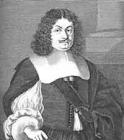

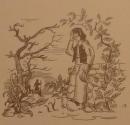

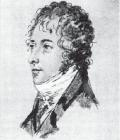

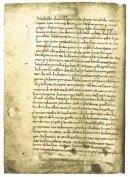
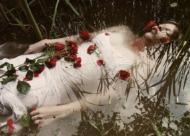
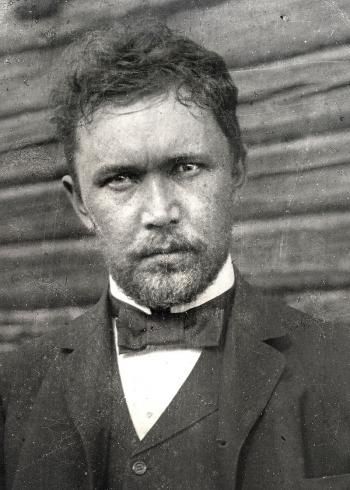
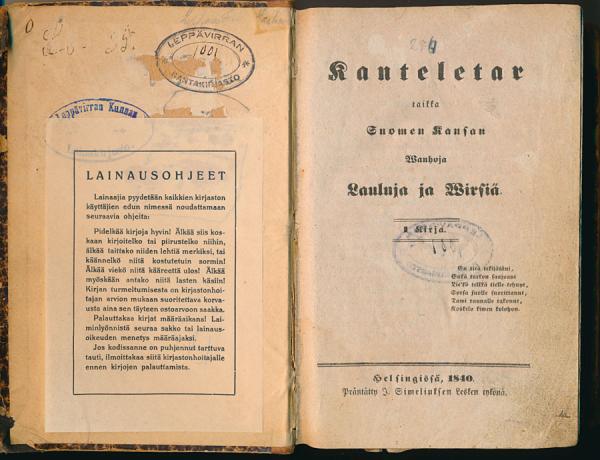

Suomalainen kansanlaulu
Ballata popolare finlandese
A Finnish folk ballad
Ballade populaire finlandaise
Velisurmaaja (The Fratricide) is a (very) old Finnish folksong. One of the many gruesome, cruel and highly dramatic murder ballads which are so common in all European balladries. The ballad comes probably from the same, widespread ballad stock of the well known Scottish Edward (Child #13, ”Quhy dois zour sword sae drap wi' bluid, Edward, Edward?”, in Percy's fake-antique spelling) and of Danish Sven i Rosengård: a striking, breathtaking dialogue between a mother and his son, in which he gradually reveals and confesses he has killed his (usually older) brother, pressed by his mother's precise questions, because the latter has "made his wife laugh" (i.e., he was making love with her). This is not the first old murder ballad included in this website: another specimen is French L'écolier assassin. Now, of course, you might ask why I'm doing this.
Well, this has to do with immigration and immigrants. Just like the first British settlers in the New World carried with themselves their old songs and ballads, which became firmly established in the American tradition, every immigration wave coming from Europe had its complete stock of old songs. The first Finnish settlers came to America as early as 1638, when they helped to found a colony named New Sweden along the Delaware River, located in present day Wilmington, Delaware, as much of present day Finland was part of the Swedish Empire at the time. Larger-scale immigration did not start until roughly two hundred years later. In the 1830s and 1840s, a few hundred Finns settled in Alaska, which at that time belonged to Russia. The Gold Rush lured others to California.
By the 1870s, large numbers of Finns had arrived in the United States, driven by unemployment and overcrowding in the urban centers. Mining and shipping companies also recruited Finns to work in the United States. They settled in Oregon, Washington, Minnesota, Wisconsin, Michigan, Ohio, Pennsylvania, New York and Massachusetts in mining, logging and agricultural communities. The immigration of Finns to the United States reached its peak in the first few years of the twentieth century and slowed after the First World War.
Finnish immigrant communities formed social organizations to help preserve aspects of Finnish culture and identity. Finnish American music-making traditionally occurred in the context of these organizations. Finnish societies began to organize music festivals featuring singers and instrumentalists in the 1890s. "The Knights and Ladies of the Kaleva," an organization formed at the turn of the 20th century to preserve Finnish customs in the United States, also sponsored music events.
In 1939, the ethnomusicologist Sidney Robertson Cowell made field recordings of songs of Finnish immigrants in Berkeley, California. Among the singers she documented was John Soininen, who knew a variety of ballads and songs. He also knew songs from the Kalevala, the Finnish national epic. The Kalevala is a compilation of ancient songs assembled into an epic in the nineteenth century by Elias Lönnrot. So, a song like Vaka vanha Vainamoinen ("Steady old Vainamoinen") was widely sung in California among Finnish immigrants. Vainamoinen, the character in this song, is said to be the inventor of the kantele, a Finnish lap harp similar to a zither that was used in the singing of epics, and the song is part of the story of this invention. John Soininen also sang a related song, Kanteleelle a song praising the kantele.
Our murder ballad, Velisurmaaja, appears to be one of the favorite old songs sung by Finnish immigrants and settlers in the New World, just like any other ballad that told of Finnish historical events, heroes, villains, lovers and death (the song was also documented by John Soininen in Berkeley, see English translation). Finnish Americans adapted their song style as they assimilated into American culture. A study of Finnish American song in northern Michigan in the 1940s by folklorist Aili Kolehmainen Jonhson showed how Finnish American workers sometimes set Finnish lyrics they authored to Anglo American tunes such as "Casey Jones”. Traditional Finnish song texts were also occasionally altered to include American references, or refrains in English. Twentieth century immigrants helped to revitalize Finnish language and culture among Finnish Americans. Folk singer, songwriter, and poet Hiski Salomaa (1891–1957) is an example. He was noted for composing in "Finglish," a combination of Finnish and English used only by Finns in the United States and Canada, in order to speak to the immigrant experience of Finns in North America.
An immigrant experience which, of course, had to face a good deal of discrimination and racism, too. Many often struggled with learning English and were delegated to lower work positions. Their customs and religious beliefs were seen as strange and exotic, and other immigrants considered them to be clannish. The fact that Finns were a relatively “new” group in the U.S. also opened them up for discrimination by employers and other immigration groups who already had a stronger foothold in the country. Finns faced racial discrimination, with many people using the Finnish language as “proof” that Finns were not European and thus fair game to be subject to unfair treatment. Some argued that Finns were Asian, meaning they should be barred from citizenship under the Asian Exclusion Act of the early 1900s. The word “Finlander” was used as a slur, along with “China Swede” and “roundhead.” Like many other immigrant groups, Finns preferred to stick together, and many “Finntowns” cropped up around the country. One well-known example is the Finntown in Brooklyn, New York, which was home to roughly 20,000 Finnish immigrants in the 1920s. Located in the Sunset Park area, Brooklyn’s Finntown was a working class neighborhood that had many Finnish-language shops, as well as the oldest nonprofit co-op housing complexes in the United States.
A present day Finn would maybe be amazed at the way Finnish immigrants were described in US newspapers. The following is a good example: ”All were undersized, squat, broad, with high cheek bones, light yellow hair and beard”, etc.
Among the immigrant labeled as Finns, there were of course also Sámis.
And, of course, Finnish immigrants too had to suffer tragedies due to an awful, and so usual, mix of racism and foolishness: almost all the young victims of the 1913 Calumet massacre during the copper strike of 1913-14 were Finnish children, mostly girls, crowded in the “Italian Hall” for a Christmas ball.
So, our (very) old Velisuurmaja, a song which accompanied thousands of Finns seeking for better life in a new world, is now part of the so-called Finnish-American heritage. I want to dedicate it not only to present day “True Finns”, but also to the whole host of True Italians, True Germans, True Spaniards, True Frenchmen, True Swedes, True Dutchmen, True Greeks, True Britons and True Martians that infect our continent and all the solar system. Please remember the pains our mothers and fathers had to endure. Please remember their songs. [RV]
The ballad is given here in one of its many versions, strikingly performed by Niekku. The English translation is reproduced from Lyricstranslate, made by a native Finn. Of course, I can't fully understand if this translation is fully reliable and I kindly ask Juha Rämö to check it (doesn't “kultainen” mean “golden”?) and/or to make a better translation. I'll make an Italian translation later.